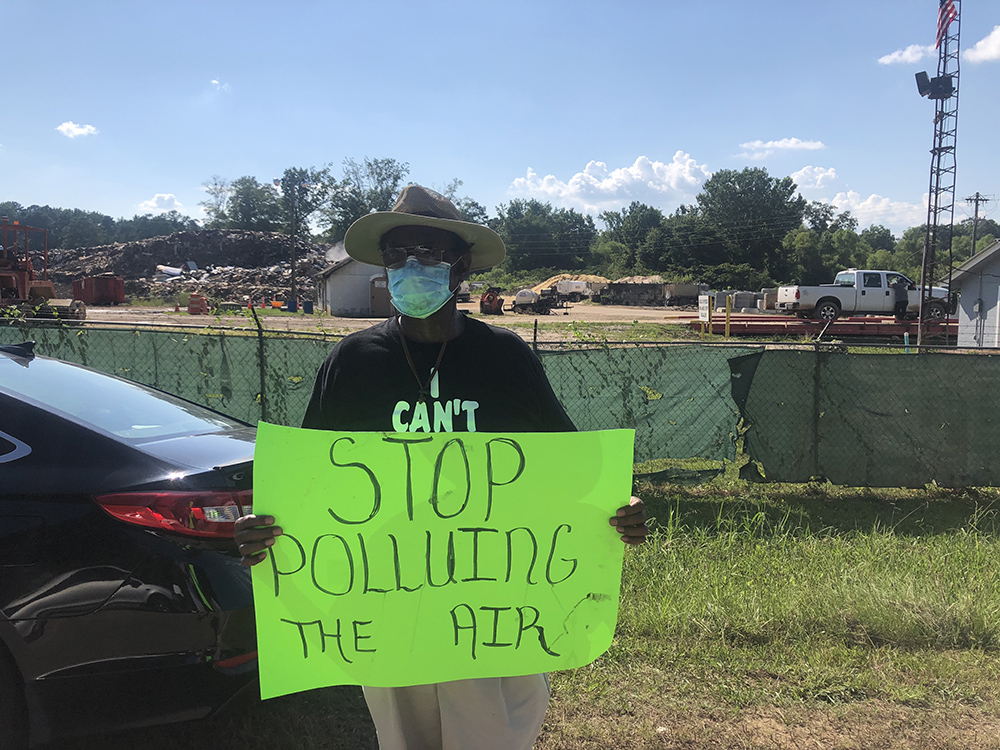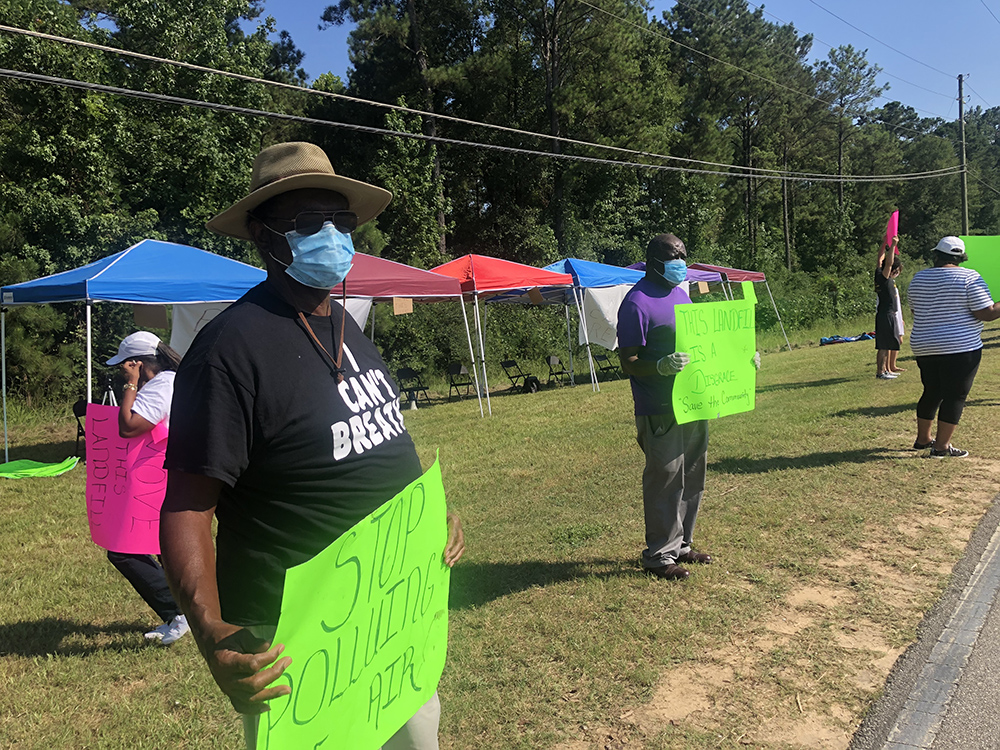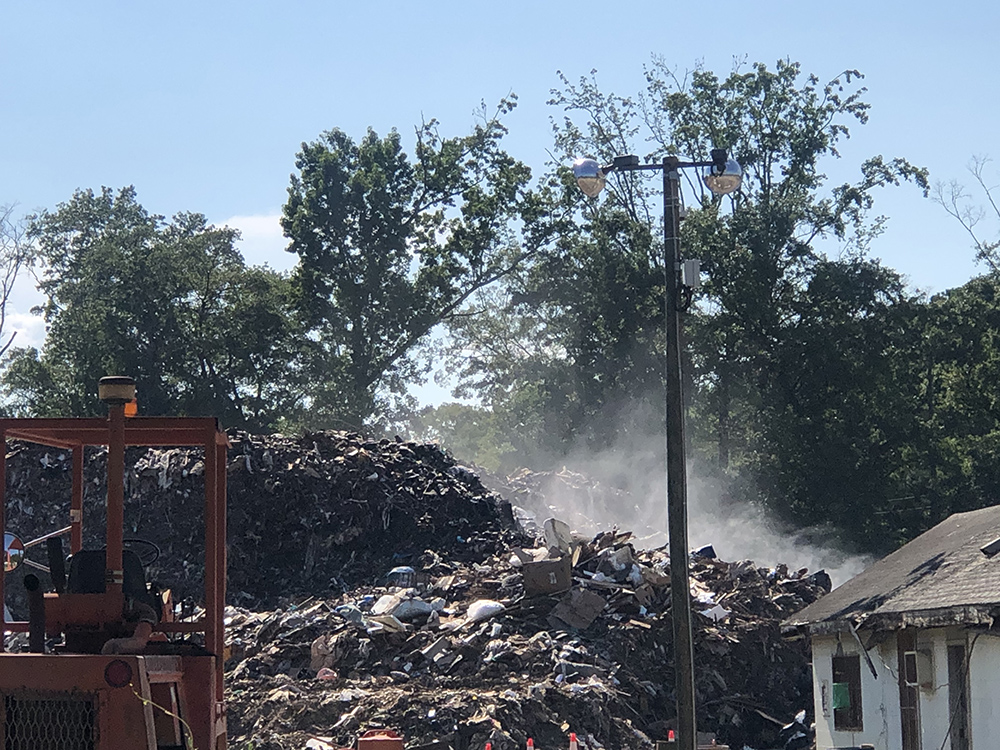By Hannah Lester
Associate Editor
hlester@opelikaobserver.com
Sweat rolled down the necks of the protestors who stood alongside the road that boarders the Sandhill Recycling Center.
The hot afternoon sun that baked his skin did not stop the cry of ‘Black Lives Matter’ from Terry Buford on Friday during a protest at Sandhill.
Buford lives in the neighborhood next to the Sandhill Recycling Center, located at 4520 U.S. 29 and owned by D&J Enterprises, although he was there first. For years, Buford put up with the stench and problems from the recycling center until he decided enough was enough and in 2012 took a stand, he said.

Sandhill Recycling Center is approved to handle inert matter from the city of Auburn and other areas but Buford and Rev. Arthur Dowdell claim there is more than stumps and trees – there is garbage.
People in the community are suffering with respiratory problems and health issues due to the trash and the quality of the air, the activists said.
“People are dying,” Dowdell said. “It’s still important for people to care because human lives are at stake. Please. Ya’ll listen, human lives are at stake.”
Dowdell said they have looked at the water and seen nothing but frogs, that the fish are dying.

“The only things living in this water right now is nothing but frogs, but frogs can live in toxic waters,” Dowdell said. “Fish can’t live in that. So we know something is wrong with this water system. So we’re asking that they would test the water.”
Buford is asking Sandhill Recycling Center to move to a new location that will not compromise the health of local residents.
“They’re trying to kill us, it seems like,” he said.
Local Government:
Buford, Dowdell and former commissioner John Andrew Harris have approached the local governments about what can be done.
“The community is all for it, they’ve signed the petition and all of that,” Buford said. “But the offices of the city people, they don’t seem to be all that interested.”
The three spoke before the Lee County Commission on June 29 and spoke to the city council soon after.
The commissioners said that they do not have the authorization to shut Sandhill down.
When Buford first reached out for help to the Lee County Commission, many years before, Harris was an elected official.
“I brought this issue to the county commission,” Harris said. “What concerns me, all the commissioners at that time agreed with me. It was an eyesore, it was an environment hazard and it was a hazard to the community and they were wondering ‘Well, what can we do?’

“I said, ‘As a commission, we’re supposed to go out there and help the people and see what we can do about solving a problem.’ And it seemed like they didn’t want to solve the problem.”
The Auburn City Council also said the site was not under their jurisdiction. The only action it has taken with Sandhill was the original contract to send Auburn material through the site. The council did not create or approve the recycling center and therefore doesn’t have the authorization to close it.
The protestors also scheduled a call with the Alabama Department of Environmental Management to discuss their concerns.
ADEM has documents for each of its visits to the site which can be found on its website: adem.alabama.gov.
Recently, Buford reached out to local lawyers to try and find help. He is now being represented by attorney Julian McPhillips.
The latest update:
Since the group of concerned citizens and local activists began making headway and gaining support in the community, Dowdell said he has noticed Sandhill has less material.
“The only thing that I see happening is that [D&J Enterprises] is trying to get rid of this stuff,” he said.
McPhillips is also preparing a lawsuit against D&J, Dowdell said.
“ADEM has given the lawyers some ideas about how to sue them,” he said. “ … He’s getting ready to file a lawsuit and what he has done, he has talked to all of the residents. A lot of them, they are sick or they’re suffering with some sort of respiratory problems.”
The protests are held by those who live in the affected neighborhood, for the most part. Community members took notice, however, on Friday.
Two doctoral students at Auburn University, Matthew Gonzales and Olivia Martin-Pinon, were driving by when they saw the signs and decided to stop and help spread the word.
“I think that it’s important to highlight issues of health, no matter where they come from, especially when they affect significantly people of color lived-in neighborhoods,” Gonzales said. “… At this point in time, in America, nothing is more important than health and life.”
He said that sine there is an identifiable source for the neighborhood health issues, it should be addressed.
“We need to continue doing this until change comes,” Buford said. “It’s worth doing, it’s worth holding onto.”
Dowdell said the goal is not to clean the site up, but move it completely.
“We’ve got to be concerned and I can’t let it go until we have eradicated it,” he said.

